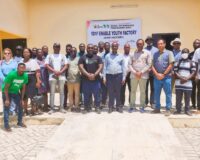In the bustling town of Konongo, Ghana, Victoria Bansah’s story is one of determination, resilience, and unwavering commitment to entrepreneurship. The founder of Vickie Bans Ventures, Victoria has defied the odds to transform her passion for craft and soap-making into a thriving business that not only sustains her family but also provides employment for many others in her community.
From Sewing to Batik: The Birth of an Entrepreneur
Victoria’s journey into entrepreneurship began with sewing, a skill she honed from an early age. However, her ambition and creativity pushed her to explore other avenues. She soon ventured into batik tie-and-dye, a traditional fabric dyeing technique that produces vibrant and unique patterns. This newfound craft quickly became her passion, leading her to refine her skills and grow her business.
Her talent did not go unnoticed. The local BAC, an institution under REP, recognized her potential and recruited her as a service provider. This role allowed her to travel across Ghana, teaching people the art of batik tie-and-dye.
“It was an incredibly fulfilling experience,” she recalls. “I loved seeing others embrace the craft and turn it into their own source of livelihood.”
Discovering a New Opportunity: The Transition to Soap Making
While working as a batik trainer, Victoria observed another essential commodity that households frequently needed—soap.
“I realized that while dyed fabrics were appreciated, soap was a daily necessity,” she explains.
She began closely watching her colleagues who were teaching soap making and, after some time, decided to learn the trade herself.
Her transition to soap making was strategic. The rising costs of materials for batik tie-and-dye, coupled with the increasing variety of textiles in the market, made it difficult for her to sustain her business.
“The cost of production kept climbing, and I knew I had to pivot to something more viable,” she says. “Soap making was the answer.”
Overcoming Challenges: The Struggle for Space and Resources
Starting a soap-making business was not without its challenges. Initially, Victoria operated from her rented apartment, but it soon became clear that this was not a sustainable option. “The chemicals used in soap production are hazardous, and I quickly realized I could not continue making soap at home. I needed a proper workspace,” she recalls.
Finding a suitable shop, however, was not easy. After months of searching, she secured a space, but she still faced financial constraints. “I had limited resources and had to start small, with only a few customers,” she shares.
Determined to make her business work, Victoria took a bold step—she started offering free samples of her soap to market women, encouraging them to try her product and provide feedback. “
The response was overwhelmingly positive,” she beams. “Once people experienced the quality of my soap, they started buying in larger quantities.”
As word spread, demand for her soap increased, and her customer base grew. Soon, her products were reaching communities beyond Konongo, including Dambai, Ofonase, and Suhume.
Scaling Up: The Role of REP and BAC in Her Success
Despite her growing success, Victoria faced another major hurdle—financial instability.
“There were times when I struggled to meet demand because I lacked the capital to buy raw materials in bulk,” she explains.
However, support from the BAC proved to be a turning point. Through their entrepreneurship training programs, she acquired valuable business management skills, which helped her scale her operations.
“The BAC played a crucial role in my journey,” she acknowledges. “Their training equipped me with the knowledge and confidence to turn my passion into a thriving business.”
Creating Jobs and Empowering Others
Today, Victoria is not only a successful entrepreneur but also a mentor and employer. She has expanded her business and now employs several people who help her produce high-quality soap. Additionally, she trains others in soap making, empowering them with the skills to start their own businesses.
“By teaching others, I am helping to create job opportunities and reduce unemployment in my community,” she says proudly. She firmly believes that small businesses play a critical role in national development. “When small businesses grow, they create jobs, reduce poverty, and contribute to the overall economic development of the country,” she emphasizes.
The Need for Continued Support
Despite her achievements, Victoria knows that many entrepreneurs like her need ongoing support. She appeals to organizations such as REP to continue providing financial and technical assistance to SMEs.
“Access to funding remains a major challenge,” she notes. “With more support in the form of loans, grants, and training, many more businesses can thrive.”
She is also an advocate for policies that support entrepreneurship, particularly for women and youth.
“When we invest in small businesses, we invest in the future,” she stresses. “A strong SME sector means a stronger economy for future generations.”
Looking back on her journey, Victoria is filled with gratitude and optimism.
“The journey has not been easy, but it has been worth it,” she reflects. “With faith, hard work, and the right support, I have been able to transform my life and contribute to my community.”
She encourages aspiring entrepreneurs to remain persistent in their pursuits.
“Never give up, even in the face of adversity,” she advises. “If I can do it, anyone can.”
Victoria Bansah’s story highlights the transformative power of entrepreneurship and the effect of initiatives like the Rural Enterprises Programme. From sewing to batik to soap making, her ability to adapt and take advantage of new opportunities has been crucial to her success. As her business keeps expanding, so does her dedication to helping others. Through her efforts, she not only offers quality products but also equips individuals with the skills to create their own livelihoods. With ongoing support from organizations like IFAD and REP, many more entrepreneurs like Victoria can emerge, contributing to the economic growth of their communities and beyond. Her journey stands as an inspiration to all—proof that with determination, innovation, and the right support, small businesses can flourish and leave a lasting impact.




